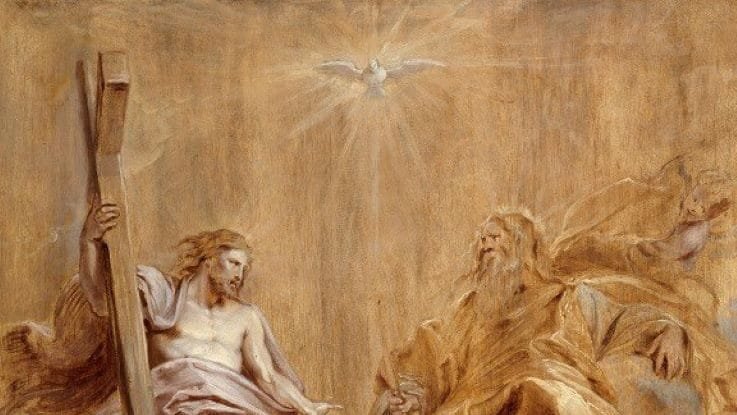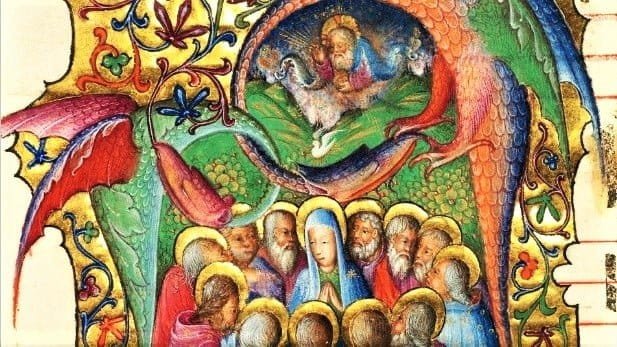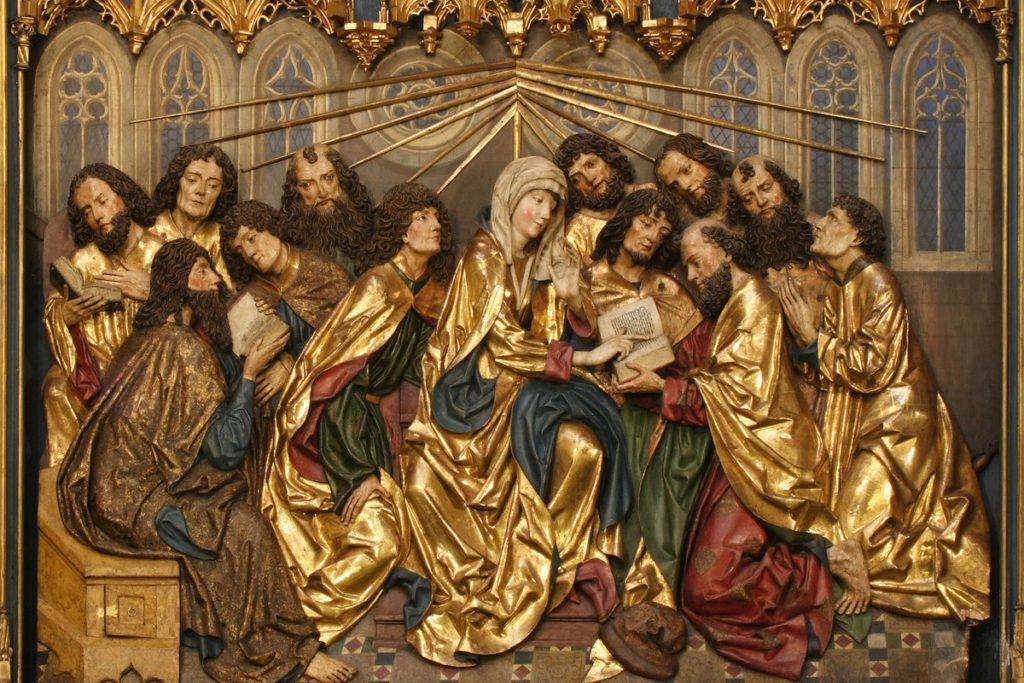POPE FRANCIS ON THE 6TH SUNDAY OF EASTER YEAR A

REGINA CAELI
Saint Peter’s Square
Sunday, 14 May 2023
__________________________________
Dear brothers and sisters, buongiorno!
The Gospel for today, the Sixth Sunday of Easter, speaks to us about the Holy Spirit, whom Jesus calls the Paraclete (cf. Jn 14:15-17). Paraclete is a word that comes from Greek, which means both consoler and advocate [editor’s note: the word also means ‘lawyer’ in Italian] at the same time. This means that the Holy Spirit never leaves us alone, he is near to us, like an advocate who assists the accused person, standing by his or her side. And he suggests to us how to defend ourselves from those who accuse us. Let us recall that the great accuser is always the devil, who puts sin inside of you, the desire to sin, wickedness. Let us reflect on these two aspects: his closeness to us, and his assistance against those who accuse us.
His closeness: the Holy Spirt, Jesus says, “dwells with you and will be in you” (cf. v. 17). He never abandons us. The Holy Spirit wants to stay with us: he is not a passing guest who comes to pay us a courtesy visit. He is a companion for life, a stable presence. He is Spirit and desires to dwell in our spirits. He is patient and stays with us even when we fall. He remains because he truly loves us; he does not pretend to love us, and then leave us alone when things get difficult. No. He is faithful, he is transparent, he is authentic.
On the contrary! If we find ourselves in a moment of trial, the Holy Spirit consoles us, bringing us God’s pardon and strength. And when he places our errors before us and corrects us, he does so gently – there is always the timbre of tenderness and the warmth of love in his voice that speaks to the heart. Certainly, the Spirit, the Paraclete, is demanding, because he is a true, faithful friend, who does not hide anything, who suggests what needs to change and where growth needs to take place. But when he corrects us, he never humiliates us, and never instills distrust. Rather, he conveys the certainty that with God, we can always make it. This is his closeness. This is a beautiful certainty.
The Spirit as Paraclete is the second aspect. He is our advocate and he defends us. He defends usfrom those who accuse us: from ourselves when we do not appreciate and forgive ourselves, when we go so far as perhaps saying to ourselves that we have failed, that we are good for nothing; from the world who discards those who do not fit into to its dictates and patterns; from the devil who is the “accuser” par excellence and the divider (cf. Rev 12:10), and does everything to make us feel incapable and unhappy.
In the face of all these accusing thoughts, the Holy Spirit suggests to us how to respond. How? The Paraclete, Jesus says, is the One who “reminds us of everything Jesus told us” (cf. Jn 14:26). He reminds us, therefore, of the words of the Gospel, and thus enables us to respond to the accusing devil, not with our own words, but with the Lord’s own words. He reminds us, above all, that Jesus always spoke of the Father who is in heaven, he made the Father known to us, and revealed the Father’s love for us, that we are his children. If we call on the Spirit, we will learn to embrace and recall the most important truth of life that protects us from the accusations of the evil one. And what is the most important truth in life? That we are beloved children of God. We are God’s beloved children: this is the most important truth, and the Spirit reminds us of this.
Brothers and sisters, let us ask ourselves today: Do we call on the Holy Spirit? Do we pray to him often? Let us not forget about the one who is close to us, or rather, is within us! Then: Do we listen to his voice, both when he encourages us and when he corrects us? Do we respond with Jesus’s words to the accusations from the evil one, to the “tribunals” of life? Do we remember that we are beloved children of God? May Mary make us docile to the voice of the Holy Spirit and sensitive to his presence.
______________________
Source: https://www.vatican.va/content/francesco/en/angelus/2023/documents/20230514-regina-caeli.html
6th Sunday of Easter, Year A, Regina caeli address, May 21, 2017.

Cutting from an antiphonal, about 1430–1435, Tempera and gold on parchment
Leaf: 11.9 × 12.5 cm (4 11/16 × 4 15/16 in.), Ms. 95 (2005.28)
The J. Paul Getty Museum, Los Angeles, Ms. 95
Dear Brothers and Sisters, good morning!
Today’s Gospel (cf. Jn 14:15-21), the continuation of that of last Sunday, takes us back to the moving and dramatic moment of Jesus’ Last Supper with his disciples. John the Evangelist gathers from the lips and heart of the Lord His last teachings, before His Passion and death. Jesus promises his friends, at that sad, dark moment, that after him, they will receive “another Paraclete” (v. 16). This word means another “Advocate”, another Defender, another Counsellor: “the Spirit of Truth” (v. 17); and he adds, “I will not leave you desolate; I will come to you” (v. 18). These words convey the joy of a new Coming of Christ. He, Risen and glorified, dwells in the Father and at the same time comes to us in the Holy Spirit. And in his new coming, he reveals our union with him and with the Father: “You will know that I am in my Father, and you in me, and I in you” (v. 20).
Today, by meditating on these words of Jesus, we perceive with the sense of faith that we are the People of God in communion with the Father and with Jesus through the Holy Spirit. The Church finds the inexhaustible source of her very mission, which is achieved through love, in this mystery of communion. Jesus says in today’s Gospel: “He who has my commandments and keeps them, he it is who loves me; and he who loves me will be loved by my Father, and I will love him and manifest myself to him” (v. 21). So, love introduces us to the knowledge of Jesus, thanks to the action of this “Advocate” that Jesus sent, that is, the Holy Spirit. Love for God and neighbour is the greatest commandment of the Gospel. The Lord today calls us to respond generously to the Gospel’s call to love, placing God at the centre of our lives and dedicating ourselves to the service of our brothers and sisters, especially those most in need of support and consolation.
If ever there is an attitude that is never easy, even for a Christian community, it is precisely how to love oneself, to love after the Lord’s example and with his grace. Sometimes disagreements, pride, envy, divisions, leave their mark even on the beautiful face of the Church. A community of Christians should live in the charity of Christ, and instead, it is precisely there that the evil one “sets his foot in” and sometimes we allow ourselves to be deceived. And those who pay the price are those who are spiritually weaker. How many of them — and you know some of them — how many of them have distanced themselves because they did not feel welcomed, did not feel understood, did not feel loved. How many people have distanced themselves, for example, from some parish or community because of the environment of gossip, jealousy, and envy they found there. Even for a Christian, knowing how to love is never a thing acquired once and for all. We must begin anew every day. We must practice it so that our love for the brothers and sisters we encounter may become mature and purified from those limitations or sins that render it incomplete, egotistical, sterile, and unfaithful. We have to learn the art of loving every day. Listen to this: every day we must learn the art of loving; every day we must patiently follow the school of Christ. Every day we must forgive and look to Jesus, and do this with the help of this “Advocate”, of this Counsellor whom Jesus has sent to us that is the Holy Spirit.
May the Virgin Mary, the perfect disciple of her Son and Lord, help us to be more and more docile to the Paraclete, the Spirit of Truth, to learn every day how to love each other as Jesus loved us.
SOURCE: http://w2.vatican.va/content/francesco/en/angelus/2017/documents/papa-francesco_regina-coeli_20170521.html
EMPHASIS MINE.


